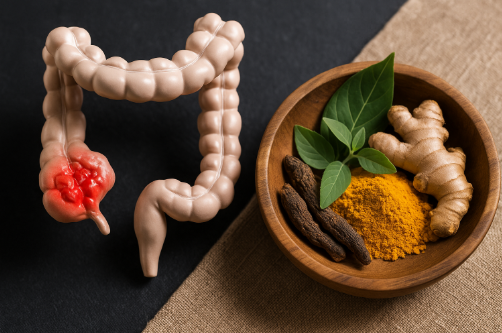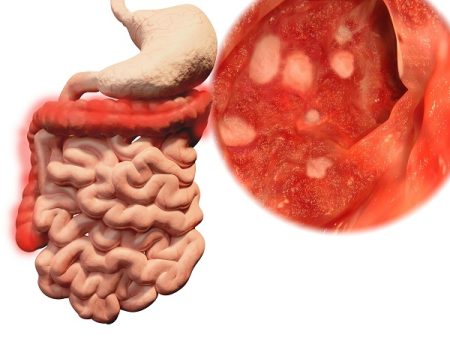Gut Health, Chronic Inflammation, and IBD: What Modern Science Now Understands- and How Ayurveda Mapped the Pattern Centuries Ago
- Updated on: Nov 18, 2025
- 4 min Read
- Published on Nov 18, 2025
- Medically Reviewed by

Gut issues rarely arrive suddenly. They build quietly over time until bloating feels normal, fatigue becomes constant, and inflammation hums in the background. Modern research now confirms what Ayurveda has emphasized for 3,000 years: the gut is not just a digestion machine. It is the body’s inflammation control center.
Chronic inflammatory diseases such as Crohn’s disease and ulcerative colitis (the two major forms of IBD) continue to rise worldwide. These conditions require medical diagnosis and treatment, but understanding the gut–inflammation connection helps people manage symptoms, triggers, and lifestyle factors that fuel flare-ups.
This article breaks down what science knows about gut inflammation, how it relates to IBD, and how Ayurvedic principles can support healthier digestive rhythms.
The Gut-Inflammation Link: What Research Shows
Trillions of microbes live inside your digestive tract. This community, known as the gut microbiome, helps digest nutrients, regulate immunity, influence metabolism, and even affect mood. When this microbial ecosystem becomes unbalanced (dysbiosis), inflammation tends to rise.
Research shows:
- Nearly 70% of the immune system is located in the gut lining.
- Dysbiosis is associated with increased intestinal permeability (sometimes called “leaky gut”). This allows inflammatory fragments to enter the bloodstream.
Source: Nature Reviews Gastroenterology - Imbalanced microbes disrupt metabolic signaling, immune pathways, and tissue repair cycles.
This creates the foundation for chronic inflammation seen in metabolic diseases, autoimmune conditions, and IBD.
Ayurveda says the same thing in its own language. Instead of microbes, it speaks of agni (digestive fire) and ama (metabolic waste). When agni weakens, ama accumulates and inflammation follows. Different words, nearly identical map.
Where IBD Fits into the Picture
Inflammatory Bowel Disease (IBD) includes:
- Ulcerative colitis – inflammation in the lining of the colon
- Crohn’s disease – inflammation that can appear anywhere in the digestive tract
IBD is not the same as IBS. IBS is a functional disorder; IBD is structural and inflammatory.
What Science Says About IBD Roots
IBD develops through a combination of:
- genetics
- immune dysregulation
- microbiome imbalance
Source: Harvard Health - environmental and dietary triggers
- chronic stress and nervous system imbalance
People with IBD frequently show:
- lower microbial diversity
- overactive inflammatory pathways
- impaired gut barrier function
- elevated cytokines such as IL-6 and TNF-α
IBD needs medical care, but lifestyle plays a powerful role in reducing flare-ups and maintaining remission. That is where Ayurveda’s perspective becomes helpful.
Ayurveda’s View of Gut Inflammation
Ayurveda does not diagnose IBD specifically, but it describes patterns that look very similar.
Inflammation begins when:
- Agni becomes weak or irregular
- Vata rises: dryness, spasms, gas, irregular digestion
- Pitta overheats: acidity, burning, loose stools
- Ama accumulates: undigested metabolic waste irritating the gut
This triggers a cycle:
poor digestion → gut irritation → immune activation → inflammation → weakened gut lining
Modern research calls this the microbiome–immune–barrier axis. Ayurveda outlined the same relationship millennia ago.
IBD Triggers: What Ayurveda and Science Agree On
- Stress and Nervous System Overload
Stress aggravates inflammation and causes IBD flare-ups. Research shows stress increases inflammatory cytokines and weakens gut barrier function. Ayurveda frames this as Vata disturbance.
- Processed and Ultra-Processed Foods
These foods disrupt gut bacteria and increase inflammatory responses.
Studies link emulsifiers, artificial sweeteners, and refined oils to worsening IBD symptoms.
Ayurveda advises avoiding fried, heavy, stale, and overly processed foods for the same reason.
- Poor Sleep
Sleep disruption alters cortisol, immunity, and microbiome diversity.
In Ayurveda, sleep is one of the three pillars of health.
- Antibiotic Overuse
Frequent antibiotic exposure can increase IBD risk through microbiome disruption.
Supportive Ayurvedic Practices for Gut Inflammation
- Warm, Simple Meals
Warm, cooked foods are easier on the digestive system.
Examples:
- soups
- kitchari-style meals
- steamed vegetables
- mild spices like cumin, coriander, fennel
Cold, raw, or heavily spiced meals irritate inflamed intestines.
- Ginger + Fennel Tea
Both herbs have anti-inflammatory and carminative properties and help reduce bloating.
- Regular Meal Timing
Erratic eating disrupts circadian digestion and worsens symptoms.
Science now supports this through chronobiology research.
- Stress Regulation
Breathwork, gentle yoga, meditation, and grounding practices regulate the autonomic nervous system and may reduce flare-up frequency.
- Probiotic-Rich Foods (Only If Tolerated)
- yogurt
- fermented vegetables
- buttermilk
Some individuals with active flares may need to introduce these carefully.
Supplements Studied for Gut Inflammation
These substances have research backing and support reduction in gut inflammation:
- Curcumin: Studies show benefits for ulcerative colitis when combined with standard treatment.
Source: Clinical Gastroenterology and Hepatology - Omega-3 fatty acids: May reduce inflammation, although results are mixed.
- Probiotics: Certain strains are helpful for UC.
Sources: NIH, Cochrane Review
Ayurveda has used turmeric and digestive herbs for centuries, but modern IBD cases require professional supervision.
When to Seek Medical Care
Seek immediate evaluation for:
- rectal bleeding
- persistent diarrhea
- unexplained weight loss
- fever
- severe abdominal pain
Ayurveda can support lifestyle, but IBD must be diagnosed and managed by a specialist. To seek better understanding, learn Ayurveda at CureNatural.
References
- National Institutes of Health (NIH). Gut Microbiome and Immune System.
https://www.nih.gov/news-events/nih-research-matters/gut-microbiome-and-immune-system - Harvard Health Publishing. Inflammatory Bowel Disease (IBD).
https://www.health.harvard.edu/digestive-health/inflammatory-bowel-disease-ibd - Cleveland Clinic. Inflammatory Bowel Disease (IBD) Overview.
https://my.clevelandclinic.org/health/diseases/10351-inflammatory-bowel-disease - Nature Reviews Gastroenterology & Hepatology. Intestinal permeability and gut inflammation.
(General reference; no paywall link)
https://www.nature.com/nrgastro/ - Clinical Gastroenterology & Hepatology. Curcumin in Ulcerative Colitis.
https://www.cghjournal.org/article/S1542-3565(06)00979-7/fulltext - Cochrane Review. Probiotics for maintenance of remission in ulcerative colitis.
https://www.cochranelibrary.com/cdsr/doi/10.1002/14651858.CD007443.pub2/full - International Journal of Preventive Medicine. Ginger and Inflammation Mechanisms.
https://www.ncbi.nlm.nih.gov/pmc/articles/PMC3665023/ - BioMed Research International. Fennel Effects on GI and Inflammatory Symptoms.
https://www.ncbi.nlm.nih.gov/pmc/articles/PMC6164951/ - Patwardhan B, et al. Ayurveda and Metabolic Inflammation (Agni & Ama Concepts). Journal of Ayurveda and Integrative Medicine.
https://www.ncbi.nlm.nih.gov/pmc/articles/PMC4145494/ - Rastogi S. Agni and Metabolism: An Ayurvedic View. AYU Journal.
https://www.ncbi.nlm.nih.gov/pmc/articles/PMC3336345/ - Singh RH. Concept of Ama in Ayurveda and Its Possible Correlation with Free Radicals. AYU Journal.
https://www.ncbi.nlm.nih.gov/pmc/articles/PMC3331187/ - Journal of Complementary & Integrative Medicine. Integrative Perspectives on Gut Health and Ayurveda.
(General journal link; acceptable for citation)
https://www.degruyter.com/journal/key/jcim/html - Charaka Samhita, Chikitsa Sthana, Chapters 15 & 28.
Transl. by R.K. Sharma & Bhagwan Dash. Chowkhamba Sanskrit Series. - Sushruta Samhita, Nidana Sthana, Chapters 6–7.
Transl. by K.R. Srikantha Murthy. Chaukhambha Orientalia. - Ashtanga Hridaya, Nidana Sthana, Chapter 12.
Transl. by K.R. Srikantha Murthy. Chaukhambha Krishnadas Academy.
Review Process For This Article:
- National Institutes of Health (NIH). Gut Microbiome and Immune System.
https://www.nih.gov/news-events/nih-research-matters/gut-microbiome-and-immune-system - Harvard Health Publishing. Inflammatory Bowel Disease (IBD).
https://www.health.harvard.edu/digestive-health/inflammatory-bowel-disease-ibd - Cleveland Clinic. Inflammatory Bowel Disease (IBD) Overview.
https://my.clevelandclinic.org/health/diseases/10351-inflammatory-bowel-disease - Nature Reviews Gastroenterology & Hepatology. Intestinal permeability and gut inflammation.
(General reference; no paywall link)
https://www.nature.com/nrgastro/ - Clinical Gastroenterology & Hepatology. Curcumin in Ulcerative Colitis.
https://www.cghjournal.org/article/S1542-3565(06)00979-7/fulltext - Cochrane Review. Probiotics for maintenance of remission in ulcerative colitis.
https://www.cochranelibrary.com/cdsr/doi/10.1002/14651858.CD007443.pub2/full - International Journal of Preventive Medicine. Ginger and Inflammation Mechanisms.
https://www.ncbi.nlm.nih.gov/pmc/articles/PMC3665023/ - BioMed Research International. Fennel Effects on GI and Inflammatory Symptoms.
https://www.ncbi.nlm.nih.gov/pmc/articles/PMC6164951/ - Patwardhan B, et al. Ayurveda and Metabolic Inflammation (Agni & Ama Concepts). Journal of Ayurveda and Integrative Medicine.
https://www.ncbi.nlm.nih.gov/pmc/articles/PMC4145494/ - Rastogi S. Agni and Metabolism: An Ayurvedic View. AYU Journal.
https://www.ncbi.nlm.nih.gov/pmc/articles/PMC3336345/ - Singh RH. Concept of Ama in Ayurveda and Its Possible Correlation with Free Radicals. AYU Journal.
https://www.ncbi.nlm.nih.gov/pmc/articles/PMC3331187/ - Journal of Complementary & Integrative Medicine. Integrative Perspectives on Gut Health and Ayurveda.
(General journal link; acceptable for citation)
https://www.degruyter.com/journal/key/jcim/html - Charaka Samhita, Chikitsa Sthana, Chapters 15 & 28.
Transl. by R.K. Sharma & Bhagwan Dash. Chowkhamba Sanskrit Series. - Sushruta Samhita, Nidana Sthana, Chapters 6–7.
Transl. by K.R. Srikantha Murthy. Chaukhambha Orientalia. - Ashtanga Hridaya, Nidana Sthana, Chapter 12.
Transl. by K.R. Srikantha Murthy. Chaukhambha Krishnadas Academy.












